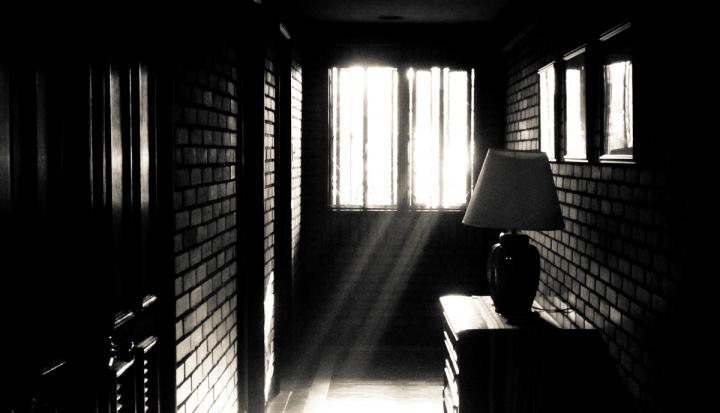Midway through Magnolia’s baptism, Deacon Lindell said it was time for an exorcism. Though once a routine part of the baptismal rite, exorcisms aren’t included in most baptisms now, and it was new to me. The fleeting thought that crossed the minds of my husband and me was of the famous movie The Exorcist, to which we both have a connection. My husband attended Georgetown University, the site of the horror flick’s filming, and I currently work with the religious order responsible for having exorcised the demon from the real-life human being on whom the notorious film is based.
Instead of making an aside about this to my husband, I fastened my eyes on my daughter’s doe-brown orbs, which were, in turn, gazing on the lights beaming down from the ceiling, on the dome of sky blue and the angels skimming around that painted surface, on the marble and shine surrounding us. She smelled like musk and oil, a divine waft lifting toward me from where Deacon Lindell had marked her chest with chrism.
Magnolia smiled and chattered, twirled and spun in my arms, threw back her head, arched her spine to see Deacon Lindell and all the church and its visitors from an inverted vantage point. I admired her adventurous strength in seeking a different perspective on the day. I pressed the flesh of my cheek to the pillow of hers, rosy brown and plump. Pride and joy welled as she smiled and laughed, enjoying every moment of her day and helping me enjoy as well.
My daughter’s baptism was a good, glowing day, stacked on another mostly good day, stacked on several preceding good weeks. They were notable in contrast to the months before, which by and large were not good at all, notwithstanding the miracle that was my daughter and the ongoing wonder that is my growing, changing toddler son.
Despite my beloved bairns, despite all they mean to me and the love I have for them, my mental health had seen better days than those after my daughter’s birth. While it’s common for many new moms to struggle with exhaustion and frustration, to fluctuate between emotional extremes, or to feel anxious or cry, these “baby blues” typically resolve after a couple of weeks. My symptoms—like those of as many as one in five new moms who experience postpartum depression—dragged on and on. The six months after Magnolia joined our family were some of the most challenging of my life.
They were also some of the most joyful. During the baptism, when Deacon Lindell drenched Magnolia’s head in holy water, she suddenly jolted her torso as he recited “in the name of the son.” She blinked a couple of slow, hard blinks and then sprang upright in my arms, opened her strawberry of a mouth, and smiled. Our son Henry, meanwhile, spent the ceremony collecting copies of the Gather hymnal and lining them up one beside another on the pew, slowly leafing through the pages, sitting quietly and calmly. He joined Magnolia, Sean, and me when we went in front of the altar to be blessed. I put my palm on the silken shag of his hay-colored hair—he is so tall now he nearly reaches my waist—while I held his squirrel of a sister in my other arm.
To have been blessed with a life filled with such love and health and the awesome phenomenon of my children’s growth was cause for a coda of gratitude. And I was deeply grateful. That the pain of depression persisted amid the bright light my children cast on my life was as confounding as the need for an exorcism of infants at a religious sacrament welcoming them into my faith’s perplexing fold.
The weeks immediately preceding Magnolia’s birth had been rife with anxiety and depression, but the seeds of my waning mental health had actually been planted much earlier. During my pregnancy, as our family prepared to move into a new home, I packed up the entirety of our first home by myself. I’m certain now, in retrospect, that a large part of why I did all that packing—literally every glass and plate, every book and drawer—was that I couldn’t relinquish control and let my husband help me. I couldn’t trust him to do it the right way, which was, in my narrow interpretation at that time, my way. So I did it all. It was not a healthy choice, but it was one I felt compelled to make.
When my daughter was born, I couldn’t do it all anymore. Sean had never learned how to help with many things in our home life, because I’d never let him and because he’d never had to. Besides Sean, I didn’t have many people to turn to for help. Splinters in other relationships precipitated the growth of the pernicious seeds of depression that had been invisibly taking root within me. Their vines strengthened suddenly; it shocked me how swiftly I cracked under the pressure of needing to make do with way less than my long-established version of perfection.
Even six months into Magnolia’s life, my mind, at the worst moments, was at the mercy of a dark power that defied logic and trumped reason. I didn’t understand how it persisted, subsiding for days—and at times even weeks—then snaking back out of the tall grass to poison my heart and nerves. I wished Deacon Lindell could have exorcised me. I wasn’t sure what he would have said or, more generally, what spiritual guidance my faith could offer someone suffering from mental illness.
My anxiety and depression felt separate from my spirituality. My relationship with God, as with my friends, was removed insofar as my mental health was concerned. I could draw some counsel and support there, if and when I chose to seek it. Mostly though, I hung onto my struggles, not wanting to bother anyone with them or ask for help, but also fearing they wouldn’t have the time or wouldn’t want to give it, or that they wouldn’t say the right thing or support me without judgment. I was lonely. I didn’t believe I had friends to whom I could turn, even if I’d wanted to. It hadn’t occurred to me to take my struggles to God. In the darkness of depression, I didn’t understand what God could provide me.
But I’ve since moved toward accepting that God is not outside of my experience, the same way God is the holy water, the sacrament of baptism, and the Eucharist. Maybe I’m not meant to understand how that is possible. Maybe, even, it is best not to try.
In my mental anguish, I’ve found an invitation to need God more and to cling more closely to the mystery of my faith, trusting that at least some smidgen of gratitude and wonder can be found in the incomprehensible. And that it will be enough to carry me through any darkness.
This article appeared in the October 2015 issue of U.S. Catholic (Vol. 80, No. 10, page 23–25).
Image: Flickr cc via Ace Bonita













Add comment